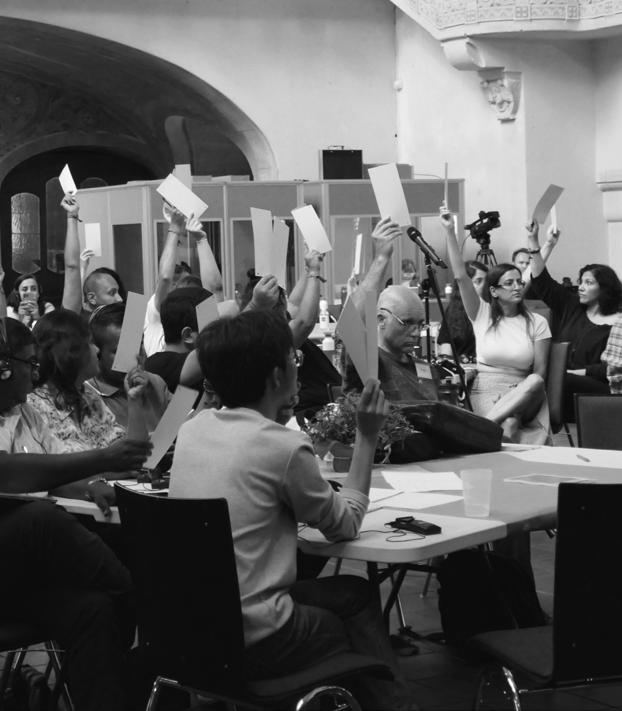
7 minute read
MOZAIK 40
we are proud to present to you the WSCF's view on this issue in the Public Issue Statement.
Our authors from the UK, Naomi Orrell and Victoria Turner, made us think about such topical issues as the protest movement and the participation of Christian youth in it, and what the church allocates its funds for, and whether the giver and the receiver are always in sync.
Advertisement
We would like to thank Natia Tsintsadze, who is completing her journey this year as Regional Secretary and Programme Director for Interfaith Dialogue and Cooperation of WSCF-Europe, for outlining the importance of this issue's topic in her introductory article.
Finally, (and as Editor-in-Chief’s personal remark) I want to welcome Kateryna Potapenko as co-editor of MOZAIK. The energetic and creative work of her and her team made possible what seemed improbable. Our journal cannot be in better hands!
Introductory article
Youth Advocacy - by Natia Tsintsadze
Section 1 I Diversity & Inclusion
Glory to the non-binary God! - by Divy Sallentes Uptegrove
Women of Faith - by Mira Neaimeh
Section 2 I Ecological Justice
Creation equality - a foolish voice for God's creation and those in it - by Agge Angusson
Making the climate catastrophe a priority - by Christiane Ehrengruber
Section 3 I Social & Economic Justice
Feminism 2023 - Intersectional and in Solidarity - by Christiane Ehrengruber
The Church and money: Not a very British question - by Victoria Turner
The future of higher Education: should we be worried? - by Ruramai Erasmas Mutimusakwa
Dear reader, we hope you enjoy this issue as much as our team enjoyed making it for you!
Katya and Daniel Co-editor and Editor-in-chief
Section 4 I Democracy, Human Rights and Digitalisation
Christ at the Picket Line - by Naomi Orrell
The War, The Church, The Social Media - by Kateryna Potapenko
Building Our Stories: Reflections on Decolonisation from Two Nations
- by Alisha Jefferis and Kej Andres
Special section
Public Issue Statement: Russian Military Invasion To Ukraine
And The Role Of The Ecumenical Movement
- BY NATIA TSINTSADZE
“Ever tried. Ever failed. No matter. Try again. Fail again. Fail better."
In 2022, the world stepped into the third year of the pandemic and was still wrestling with the devastating challenges caused and escalated by the COVID-19 pandemic. Prioritising young people's development, empowerment, inclusion, and well-being has been key in rebuilding back better. Young people, particularly those from vulnerable groups, were affected the most by the pandemic. In September 2021 the European Union President Ursula von der Leyen, in her State of the Union address, first voiced the proposal to celebrate the young people, their efforts and commitments during the COVID-19 pandemic by declaring 2022 the European Year of Youth. They were put at the centre of the renewal process in Europe and as a base for enhancing democracy, solidarity and peace. Engagement and participation of all young people were put forward in the vision of Future of Europe, shining a light on the importance of European youth to build a better future that is greener, more inclusive and digital. Designating 2022 as the year focused on young people was a big ambition from the European Union and a big responsibility towards young people. It meant increased efforts to promote youth participation in policy-making, empower and engage young people in the development and decision-making processes and include youth priorities in European Union (EU) policy areas. The EU Youth Dialogue was introduced as a dialogue mechanism between young people and decision-makers to ensure that young people's opinions, needs and ideas are heard and considered in the EU youth policies. Most, if not all, youth civil society organisations dedicated their activities to educating, empowering and enhancing the youth to be a catalyst of positive change in their contexts and contribute to achieving the European Youth Strategy 2019-2027.
2022 started with a hope to move forward with confidence and resilience in a post-pandemic perspective giving young people more and wider opportunities for the future. The future that will be better and more sustainable. There was hope and an even bigger dream of a stronger European Union with more equality, diversity, effective leadership and decisions, better social cohesion and stronger democracies. The European Year of Youth was an ambitious dream to make this happen with a straightforward path to enhance education, training, learning, employment, and civic and political participation of all young people in every part of Europe.
No one could imagine back then that in February 2022, the hope and dreams of millions in Europe could be swept away by Vladimir Putin's military attack on Ukraine. Europe and the world again faced the rise of authoritarianism by witnessing the largest conflict in Europe since World War II. Russian invasion of Ukraine is not only an invasion of one country: it is a war against democracy, freedom, human rights and values that the European society has been striving for the past decades.
The war in Ukraine created a new reality in which coalitionbuilding, advocacy and solidarity gained the utmost importance. This new reality or new era leaves no space for simple words of solidarity, but it clearly shows the need to go beyond traditional conflict resolution and peace-building actions. It requires new responses and the most effective actions for the future we dream of.
At the time when the world is grappling with several existential crises, the COVID-19 pandemic, climate crisis, growing socio-economic inequalities, marginalisation of communities because of their identities, social fragmentation, economic stagnation, structural discrimination, ethnic conflicts and now the Russian invasion in Ukraine, new and more effective means are all the most necessary. The year that was meant to relaunch and reinforce inclusion, solidarity and equality in Europe triggered more uncertainties and fears for the future. Messages of intolerance and hatred are fabricated and spread by people who seek power and are fuelled by selfishness, negative identities, and being against others. And again, young people found themselves in the most vulnerable positions, particularly children, women and young refugees fleeing the Russian military invasion in Ukraine.
We often hear that the future for a new generation should only be built with the involvement of young people in all kinds of processes. However, it is clear now that the imperative of youth empowerment cannot be continued as just involving a certain number of youth representatives in some symbolic meetings. Instead, a more radical approach is needed. As never before, there is a need for real involvement, real empowerment and real dialogue so that the voices of young people are really heard, and their opinions and ideas are integrated into the decision-making processes. Who else, if not the young people, can be courageous, fearless and persistent in their dreams and actions? The European Year of Youth was a perfect showcase that building the future FOR youth should inevitably be done WITH youth, involving them in creating a more sustainable, peaceful, just and democratic future, their future. Thus, young citizens should be an integral part of the decision-making processes and put at the centre of democratic participation beyond the declared year of youth. It is our mutual responsibility to ensure the lasting legacy of the European Year of Youth for the years to come and for the future to create.

It also became evident that empowerment of young people should include ALL young people and in particular those from disadvantaged groups, young people coming from conflict areas, less developed local communities and those from the Roma community, young people with disabilities and those belonging to ethnic, religious and sexual minorities, and much more. All the voices, hopes and dreams of young Europeans should be heard and included in building the future of Europe.
In order to achieve a future that is sustainable, inclusive, just and democratic, young people should be promoted to advocate for their rights, and their engagement in the policy-making processes should be ensured. All of us should prioritise and take practical steps to assist young people to grow towards full participation in society and strengthen youth engagement in policy development at all levels. There is a clear need for reinforced support and longterm policy strategies for youth advocacy. Advocacy means an action to speak out and influence people in positions of power to make decisions that affect the lives of all and improve the political, economic and social conditions. Why youth advocacy? It is important because young people believe passionately in the power of advocacy as a driving force for good for those who face injustice and inequality. And because young people can have a powerful voice and role in every advocacy action targeting a wide range of stakeholders, including politicians, decision-makers, institutions, media and general public. Change is needed, and young people are ready to make a difference, whether it be school, work or street, social media, voting booth or policy-making.
When Europe stands at the crossroad and faces a turning point, it is the youth who should and can take bold steps to ensure that all rights are respected, promoted and protected. The youth can lead, challenge and raise their voices for the rights and values reaffirming a shared humanity. The time for this is now. And this is when the policies should be made by young people's active participation rather than adapted for them later. Young people proved to be able to advocate for humanity and the earth in the process of healing and reviving from the devastating impact of the current crisis. They can champion policy standards on the diverse aspect of societal development. As advocacy champions, youth can influence politicians and authorities to make decisions that bring about equality, sustainable development and democracy in a society where all human beings can thrive. And again, civil society organisations play a key role and, through capacity building, leadership development, advocacy, and non-formal education empower young women and men to feel confident to stand up and speak out against injustice. Civil Society organisations provide tools and resources to inspire young people to take action for changes, however small that might be. It all starts from small actions, but inspiring ideas often have a ripple effect that can spread far beyond that action and may lead to something bigger and more powerful. Promoting positive models of youth activism motivates, inspires and creates energy resulting in impactful, more effective changes that Europe needs. We should never doubt small steps that may grow into brave actions and bold decisions. The future of Europe requires such actions from young people, who proved to be ready to take them. The youth will exercise their important democratic right next year when they vote to elect European Parliament members and the leadership of the next generation of Europeans. This is the time to dream big, be bold and brave. "Never doubt that a small group of thoughtful, committed people can change the world. Indeed, it is the only thing that ever has" (Margaret Mead).
Natia has served as an Executive for the Europe region of the World Student Christian Federation and Programme Director for interfaith Dialogue and Cooperation (October 2014 - December 2022)








